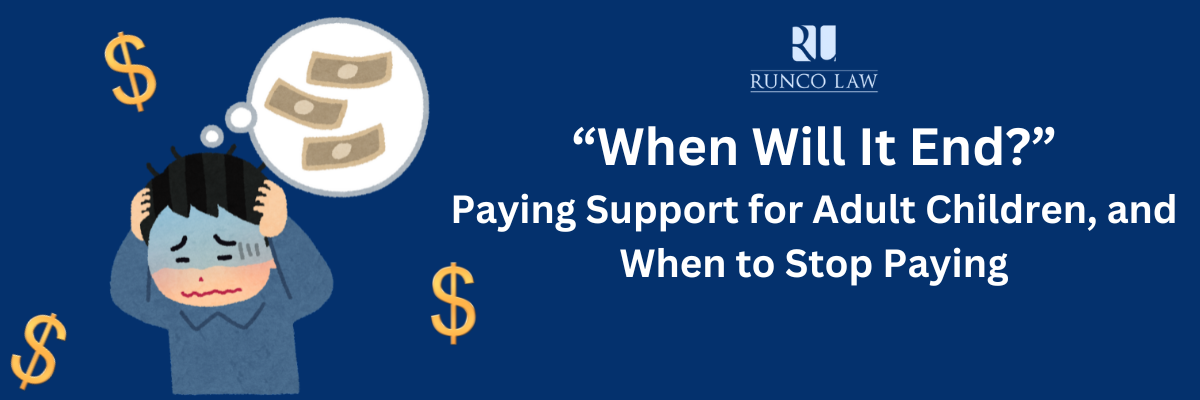Introduction
As we embark on another school year, I have received a few calls of late from both former clients and from prospective new clients about their child support obligation to their children who have turned 18. People have told them that their child support ends automatically when the child turns 18 years old, and they explain this, as if they were family law lawyers, by arguing that since the child is now a legal adult, they can take care of themselves, and do not need mom or dad’s support any longer.
Sadly, there is a lot of bad information (fake news?) and misconceptions online, on social media, and amongst many ill-informed people. Let me dispel a few myths:
- Child support does not automatically end at age 18;
- Child support does not automatically end when the child moves away to attend post-secondary school
- If the FRO is enforcing the order, they don’t automatically stop collecting it from the payor when the child turns 18, or when the child goes away to school.
As with most misunderstandings, there lies some truth within. A child who is 18 years old may or may not be entitled to child support. However, there are many factors in play that impact whether child support should end, or whether child support should continue, once a child turns 18 years old.
This blog will provide a basic summary of the law surrounding child support for children 18 years of age or older. I will review the factors that support a claim to end child support at age 18, and other factors that support a claim to continue child support for children 18 years old or older (even much older). Like all my blogs, it is not a comprehensive review of the law, it is not “written in stone” (the law can change by new legislation or by pronouncements and interpretations of judges in case law), and the facts of the case can change every so slightly to modify how the law applies to you and your case. As generally informative as I hope these blogs are, nothing beats the specific legal opinion of an informed and experienced family law lawyer.
Entitlement to Child Support
For unmarried parents, in Ontario, we are governed by Section 31(1)(a) of the Family Law Act, which says that a parent must support an unmarried child who is a minor. A minor, in turn, is a child who has not yet turned 18 years of age. This is where a lot of misinformed people stop looking and come to the conclusion, well, my child has turned 18, so my child support obligation should end, right? The correct answer is not yes or no, but maybe.
When Would Child Support End, Per the Family Law Act (FLA)
The FLA sets out factors that would disentitle a child to support past the age of the 18. These include:
- If the child is married. Once a child marries, they are not entitled to child support. I have had parties try and say they are still dependent, but the court would have none of that.
- If the child is not enrolled in a fulltime program of education. This is provided for in Section 31.1(b) of the FLA, and it is the clause that captures a lot of adult children. Once a child is finished school and, once 18, does not return to school on a fulltime basis, their entitlement to child support should For the child who does not return to school at all, i.e. does not return to or graduate from high school after turning 18, and does not go to post secondary school, it’s usually a simple determination. Support ends the last month of their 17th year.
But you may have noticed I underlined a few words in the paragraph above. Qualifier words. Should. Usually. I did so intentionally, as there are situations that need to be looked at carefully. For example:
- What does “enrolled” mean? Do you just have to be enrolled? What if you do not attend all your classes? What if you only attend some classes virtually and not in person?
- What does “a fulltime program” mean? What does it take to be fulltime? What percentage of a school curriculum makes a program parttime vs. fulltime?
- What does “education” mean? Does it only mean post-secondary school, i.e. college or university? Does it include returning to high school to complete your high school diploma? Does it include going to a trade school?
- What if there are compelling reasons that an adult child cannot be enrolled in a fulltime program of education? Sickness? Mental health? Physical health? Unaffordability? Other barriers?
The first impressions of Section 31(1)(b) of the FLA seems to offer some hope of clarity as to the issue of a child who is, or is not, in school, and their entitlement (or lack thereof) to child support. But there are many judicial decisions that have interpreted the legislation, as well as caselaw, to either qualify an adult child student for child support, or to disqualify them as well. As mentioned above, a simple single factor can change the opinion and/or eventual legal decision to grant or deny a child support form the parent.
It is beyond the scope of this blog to define every nuance. Suffice is to say, as lawyers love to say, “it depends” on the specific facts of your case to decide whether child support should end.
A little side note, to keep things interesting. Under Section 31(2) of the FLA, if a child is 16 years old or older, and has withdrawn from parental control, they are not entitled to child support. Once again, at first blush, it seems pretty clear-cut. But is it? As a lawyer, I am trained to ask the all-important question: what does “withdrawn from parental control” mean? Does it mean a child who was kicked out of the home for not abiding by house rules? Does it mean someone who decided they left because they didn’t want to abide by house rules? Does the child have to withdraw from the control of one parent, or is it both parents? What if child is at a boarding school, not living with their parents?
Thankfully, the law is a little clearer as to what constitutes “withdrawn from parental control” and as such, I recommend that if you find yourself confronted with this situation, please consult an experienced family law lawyer (like me) to advise you accordingly.
When Would Child Support Continue, Per the Family Law Act (FLA)
Looking at the FLA, and juxtaposed to the above, if a child is 18 and is enrolled in in a fulltime program of education, then we enter into the same discussions as above. Does the adult child meet the definition set out in the legislation?
But as I alluded to above, there may be reason why an adult child is still eligible support. In fact, under Section 31(1)(c) of the FLA, the law states that the parent is obliged to support a child who is unable, by reason of illness, disability or other cause, to withdraw from the charge of his or her parents.
Like above, where ss.(b) offers little hope of clarity, ss.(c) is as just as clear as mud. The case law is replete with interpretations of this section’s wording, including:
- What is “unable” mean? Is it the same as unwilling?
- What is an “illness?” Is it mental, physical, emotional?
- Does it have to be a permanent illness, or will a temporary illness suffice?
- How debilitating must the illness be? Partial or complete?
- What does “withdraw from the charge of his or her parents” mean?
Can you now appreciate that these are the sort of difficult questions with which lawyers, mediators, arbitrators, and judges must grapple, to determine whether an adult child is, or is not, still entitled to child support.
Child Support and the Divorce Act
For married parents, in Ontario, we are governed by Section 15.1 of the Divorce Act, which states that a separated spouse must pay support to a child of the marriage, which is defined therein as a child of two spouses or former spouses who, at the material time, is under the age of majority and who has not withdrawn from their charge, or is the age of majority or over and under their charge but unable, by reason of illness, disability or other cause, to withdraw from their charge or to obtain the necessaries of life.
As you can see, the Divorce Act uses language similar to that of the Family Law Act, but not the same. Practically speaking, the concepts are the same. If the child is under 19 (compared with 18 or older under the FLA), the parent owes the child a duty of child support if the child has not withdrawn from their charge (very similar to withdrawn from parental control). If the child is 19 or older, there is no duty of child support unless the child is still under their charge and is unable to do so. As with the FLA, it makes reference to “illness, disability and other cause.”
Is this any clearer than under the FLA? Not really, as there are many cases that have been argued, and will continue to be argued, to either have a child fit within the definition to be or not to be entitled to child support. It is very fact specific.
Conclusion: Heed the Red Flags
A wish to alert those parents who are looking to terminate child support for adult children to heed this warning. Before Covid-19, the law was somewhat clear that an adult child would be allowed to complete one post-secondary degree to remain entitled to child support and/or to have the parents contribute to the cost of same. anything after that, the adult child was usually on their own. During the Covid-19 pandemic, judges were more than happy to expand the definition of inability to withdraw from parental control/charge to allow older children to continue to receive child support and have parents pay for their schooling, even beyond one degree. Post-pandemic, the courts continue to be cautious about unleashing inexperienced adults into the real world of the 2020s. Again, it is dealt with on a case-by-case basis. Whether this is right or wrong is not my place to say. It is what it is.
So before you make any sudden decisions in this regard, please seek some legal advice from an experienced family law lawyer (like me).

